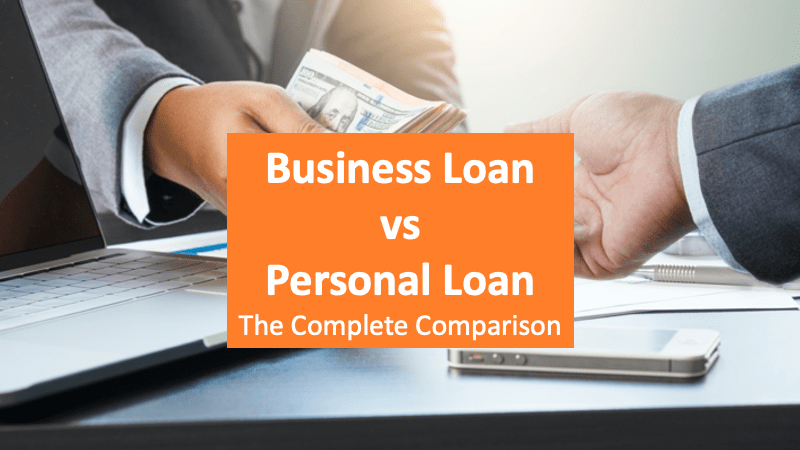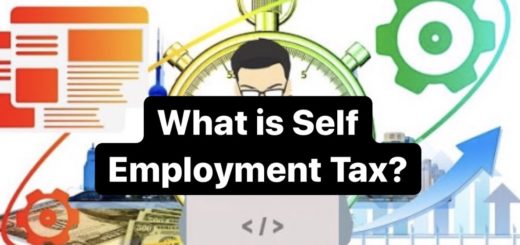Business Loan versus Personal Loan
Table of Contents
Are you asking, what’s a business loan versus personal loan? Read to discover which loan is best for your small business or sole proprietorship.

Growing and operating a small business is a lot of work, particularly for sole proprietors and self-employed individuals. Therefore, many self-employed and sole proprietors use loans to finance their business growth goals. During this process many sole proprietors find themselves evaluating business loans versus personal loans with the goal of understanding which loan is best.
In this article, we compare business loans versus personal loans. This article is the ultimate comparison on the web so we are certain it will answer your most pending questions.
Keep reading to learn about the differences, including the advantages and disadvantages of a business loan versus a personal loan. Therefore, you can make the most informed decision for your business.
What does an unsecured loan mean?
Unsecured loans are loans that are not secured with collateral. Therefore, unsecured loans are given to you based solely on your creditworthiness and credit history. You are not asked to put your assets (i.e. collateral) at risk. Therefore, in the event that you can’t pay the loan, meaning you default on your loan, the lender cannot collect any of your assets as collateral to pay back the loan. You typically need to have a high credit score to qualify for an unsecured loan.
What does a secured loan mean?
Secured loans are loans that are secured by assets, also known as collateral. For example, the bank might ask you to collateralize your loan with your home that you have built a lot of equity in or a car you own. The collateral required will vary depending on the size of the loan.
In the event that you can’t make your payments on a secured loan, or you default on your loan, the bank can take your collateral in order to collect the remaining money that is owed on the loan. Loans that are commonly secured loans are mortgages and car loans.
What is collateral?
Collateral is an asset or item of value used by the borrower to secure a loan from a lender. collateral is used in the event that the borrower defaults on their loan and can’t make the loan payments. In the event that you default on a collateralized loan, the collateral is collected from the borrower by the lender to pay back the loan. Common items used as collateral are homes and cars.
What is an alternative lender?
Alternative lenders, or nontraditional lenders, are private companies that operate like banks by providing loans to businesses. Moreover, alternative lenders provide greater flexibility surrounding certain loan requirements like credit score and annual revenue. And while alternative loans typically require higher interest rates than their conventional counterparts, alternative lenders are also more responsive to changes in repayment schedules.
Can I use a personal loan for business?
Yes. Often lenders do not restrict how you use personal loans. Therefore, you can use personal loans for business. For example, you can use a personal loan to buy business equipment, fund marketing, etc. There are many different types of business loans to finance a small business.
What is a personal loan for business?
Are you asking yourself, how do personal loans for business work?
A personal loan for business is a personal loan that you take out from which you use the funds to finance your business.
What can a personal loan be used for?
A personal loan versus a business loan is more flexible in its use than a business loan. Typically, you can use a personal loan for anything.
When you get a personal loan lenders will ask on your loan application what you intend to use the loan for. However, what you put on your application about what you intend to use your personal loan for is typically not an agreement.
Although, some lenders have restrictions on what personal loans can be used for. Therefore, please make sure you read all of the terms before you choose which personal loan is best for you.
What can a business loan be used for?
Business loans typically have more restrictions than personal loans. Therefore, in most cases, a business loan versus a personal loan, can’t be used to purchase anything. More specifically, business loans are typically restricted to business purpose use only. This means you cannot buy yourself a flatscreen TV for your home with a business loan like you can with a personal loan. Unless you intend to use the flat-screen TV you purchased with your business loan and installed in your home for strictly business use.
So, what can you use business loans for?
Business loans versus personal loans are for purchasing new inventory, paying rent on a commercial space, updating technology and equipment. Also, business loans can be used for hiring new employees, everyday expenses, or even marketing your business.
Business loans are best used for business growth and to increase revenue for your business. In addition, the amount of growth and revenue that you generate for your business should cover the costs of the load, including the interest.
Even further, some business loans can be used to refinance existing debt, such as higher interest debt, which could be advantageous to many businesses. Therefore, it is a good idea to do the appropriate shopping for the right loan. A business loan, when used properly, and when you have the right small business loan, can really help your business.
Business Loan Versus Personal Loan Differences
Review the table below for the top differences between a business loan versus a personal loan.
| Differences | Business Loan | Personal Loan |
| Use of Capital | Business loans are used to fund a business, such as equipment purchases, inventory stocking, marketing supplies, vendor payments, etc. | Personal loans can be used to fund direct business expenses such as business growth and personal expenses like a car or a house. |
| Tax Deduction | Depending on local laws, business loan interest payments might be tax-deductible based on local laws. | Personal loans are not tax-deductible because they’re not considered income. |
| Term | Business loans have longer repayment terms. | Personal loans have shorter terms and need to be paid back quicker. |
| Amount | > $50,000 up to $5 million | $1,000 – $100,000 |
| Collateral | You secure business with collateral. | You don’t secure most personal loans with collateral. |
Business Loan: Pros and Cons
What is a business loan?
A business loan is a loan issued by a lender to a borrower (such as small business owner or sole proprietor) to finance and fund their business.
Pros
When considering a business loan versus a personal loan there are a few variables to evaluate.
One of the advantages of a business loan is that with a business loan your business finances are separate from your personal finances. This is critical for a growing business and makes doing your taxes a lot easier.
In addition, often, business loans limit personal liability in the event that your business cannot pay off the loan, or default on the business loan. However, this business loan type is more commonly offered by alternative lenders. Alternative lenders often do non-recourse receivables factoring.
One of the major benefits of a business loan versus a personal loan is that a business loan helps your company build credit. When your business has good credit and a good relationship with banks, then you can get large loans at lower interest rates. Larger loans with lower APRs are great ways to finance your next expansion or whatever you need to finance. When you take out a personal loan for business, you are building your personal credit, not your business credit.
Cons
Business loans are harder to get versus personal loans. This is particularly true if your business has not established any credit yet. Also, this is true if you don’t have good personal credit because some business loans are secured with your personal credit.
In addition, the process of getting approved for a business loan can be lengthy and tedious. In some cases, there is a lot of paperwork to complete. More importantly, after putting in all of the hard work to apply for a business loan, rejection is still a possibility.
This timely and consuming process could be a huge business growth killer, especially on a small, resource-strapped business, such as many one-person operated small businesses run by self-employed individuals or sole proprietors.
Please note that you will most likely be personally responsible for repaying your business loan if your business defaults and you provided a personal guarantee for the loan. With that said, the advantage of not being personally liable for a business loan won’t apply in this case.
Personal Loan: Pros and Cons
Pros
It’s easier to get a personal loan versus a business loan.
When you get a personal loan the only thing lenders typically look at is your personal finances and credit score.
On the other hand, a business lender often evaluates both your business finances and your personal finances. This means that for a business loan you might need to provide many different financial statements. Depending on how organized your business is, this could be an easy task or a tedious one.
The last benefit of personal loans vs business loans we want to mention is personal loans are typically unsecured. Therefore, you don’t need to provide collateral to get a personal loan. Often, business loans require collateral. This can be a big challenge if you don’t have collateral.
Cons
We feel the biggest con of using a personal loan for business is that personal loan limits are smaller. In addition, the interest rates on personal loans are often higher than the interest rates on business loans. Of course, both of these factors depend on the lender, your credit score, and other variables.
This means you may not be able to get all the money your business needs via a personal loan for business. This can be a big drainer on your business growth goals.
Most importantly, when you use a personal loan for business your business won’t build credit. Your business builds credit when you take out a business loan. Business credit is very important. Building good business credit enables you to get approved for bigger business loans with better terms and lower interest rates.
In addition, when you use a personal loan for business and you default on this loan, your loan default negatively impacts your personal credit.
How to Choose a Business Loan
To find the best business loan for your business needs follow the steps below.
Research Loan Types
Evaluate each loan option that is available. There are many different types of business loans. Therefore, familiarize yourself with each one before making your decision. Pick the business loan type that best meets your business needs.
Find Lenders
Each lender has different requirements. Therefore, before applying, make sure you know the lender’s loan requirements and if you meet the requirements.
Some of the lender’s requirements might be:
- minimum income
- minimum duration of business operations
Compare APR and Loan Terms
Each lender has a different offer for their loan. Some of the loan attributes and terms where a lender’s offers may vary are the following:
- APR (Annual Percentage Rate)
- Loan Term (Length of Loan)
- Fees
- Monthly or Weekly Payments
Make sure to evaluate each lender’s offer and select the one that is best for you.
Prepare Loan Application Documents
Many loan applications require paperwork. Therefore after you have selected a lender make sure to gather all of the required documents to apply.
Apply
The business loan application process can take weeks as lenders do a deep dive into your finances. However, prequalification with a lender doesn’t mean you’re guaranteed formal approval.
Conclusion
As you can see there are many key differences between a business loan versus a personal loan. There are also pros and cons to a business loan versus a personal loan. It’s important that you take into consideration each variable that is most important to your business. In addition, consider each variable based on your unique business needs.
Falcon Expenses is a community of small business owners, sole proprietors, self-employed, independent contractors, freelancers, etc.
If you’ve recently evaluated a business loan versus a personal loan we would love to hear your story. Email your story to us at support@falconexpenses.com or post your experience in the comments below.
Sharing your experience with our community helps other small business owners like yourself make better decisions.
Good luck with your decision. Contact us if you have any questions so that we can get them answered immediately.
Was this article helpful?
We are a team of writers and contributors with a passion for creating valuable content for small business owners, self-employed, entrepreneurs, and more.
Feel free to reach out to use as support@falconexpenses.com





